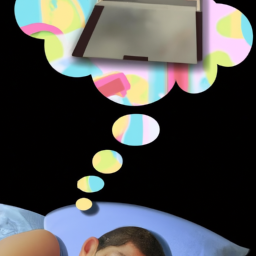While laying in bed, my mind begins to wander, causing me to have incredibly vivid and often puzzling dreams. Some of these dreams are so strange that I can’t help but contemplate their possible importance.
Have you ever experienced a similar situation? Do you find yourself pondering over the messages your dreams may be trying to convey? If yes, then this article is for you.
Dreams have always been a source of fascination for me. They can be confusing, intriguing, and even frightening at times. However, I have come to understand that our dreams are not just random thoughts or images that float around in our minds while we sleep. Rather, they hold significant meaning and symbolism that can provide insights into ourselves and our lives.
In this article, we will explore the basics of dream interpretation, uncover the messages in our dreams, address common types of dreams such as nightmares and recurring ones, and delve into the spiritual aspects of dreaming. So join me as we embark on an insightful journey into understanding what our dreams are trying to tell us!
Key Takeaways
- Dreams hold symbolic messages that can guide us towards a deeper understanding of ourselves and the world around us.
- Recurring themes or symbols in dreams can offer guidance or warnings about upcoming events in our lives.
- Emotions and subconscious play a crucial role in dream analysis.
- Seeking professional help for dream analysis can be beneficial in gaining clarity and insight into our life’s path.
Understanding the Basics of Dream Interpretation
You’re probably wondering, what do my dreams mean and how can I start interpreting them? Well, it all starts with understanding the basics of dream interpretation.
Dreams are a form of symbolic language that our subconscious uses to communicate with us. They’re not always literal and shouldn’t be taken at face value. Instead, we need to delve deeper into the personal meaning behind each symbol and image.
The role of emotions and subconscious in dream analysis can’t be overstated. Our dreams often reflect our deepest fears, desires, and unresolved issues. By paying attention to our emotional reactions during a dream, we can gain valuable insight into what’s really going on beneath the surface.
Learning how to interpret your dreams takes time and practice, but it’s an incredibly rewarding process that can help you uncover messages that may have been hidden from your conscious mind.
Uncovering the Messages in Your Dreams
As I drift off to sleep, my mind enters a mysterious realm where symbols and metaphors dance together, revealing hidden meanings waiting to be uncovered. This world of dreams is a place of symbolic representation and subconscious communication that can reveal truths about ourselves that we may not even be aware of.
If you pay attention to your dreams, you’ll notice recurring themes or symbols that can provide insight into your deepest desires and fears. Your dreams may also offer guidance or warnings about upcoming events in your life. By reflecting on the messages in your dreams, you can gain a better understanding of yourself and take action towards achieving your goals.
So, let’s explore some ways to interpret common types of dreams and unlock the secrets they hold.
Interpreting Common Types of Dreams
I find it fascinating how our dreams can reveal so much about our subconscious mind. In particular, I’m intrigued by the common types of dreams that many people experience. These include flying dreams, falling dreams, naked dreams, and teeth falling out dreams.
These types of dreams often carry symbolic meanings that can provide insight into our emotions and experiences. By exploring the interpretations of these dream types, we may gain a deeper understanding of ourselves and our innermost thoughts.
Flying Dreams
When experiencing flying dreams, your subconscious mind may be telling you to embrace freedom and explore new possibilities in your waking life. Flying symbolizes the release of limitations and the ability to rise above challenges. It is a reflection of our innate desire for growth and transformation.
To enhance this experience, you can practice techniques for lucid dreaming, such as reality checks and setting intentions before sleep. By becoming aware that you’re dreaming, you can take control of your flight and direct it towards your desired destination. This empowers you to take charge of your life and pursue your goals with confidence.
As we soar through the sky in our dreams, we may suddenly find ourselves falling towards the ground. But what do falling dreams mean? Let’s explore this next subtopic together.
Falling Dreams
If you’re experiencing falling dreams, your subconscious may be urging you to confront your fears and take a leap of faith towards personal growth and transformation. Coping with these dreams can be challenging, but it’s important to remember that they are not literal representations of your physical safety. Rather, they often symbolize the fear of failure or loss of control in waking life.
To overcome falling dreams, it’s helpful to explore the underlying emotions that may be triggering them. Are you feeling overwhelmed by a new challenge or struggling with a major decision? Recognizing and acknowledging these anxieties can help alleviate some of the stress that may be causing the dream. Additionally, practicing relaxation techniques such as meditation or deep breathing can help reduce anxiety levels overall. Remember, falling dreams are just one aspect of our complex inner worlds – by facing our fears head-on and embracing change, we have the power to transform ourselves both inside and out.
As we move on to discussing naked dreams, it’s important to note that our subconscious minds often speak in symbolism rather than literal language.
Naked Dreams
You may feel exposed and vulnerable in naked dreams, but they often symbolize a desire for authenticity and self-acceptance. When we dream of being naked in public or around others, it can be a reflection of our fear of judgment and rejection. However, it can also represent an opportunity to embrace our true selves without the need for external validation.
Symbolic meaning is prevalent in naked dreams as they often reflect our innermost desires and insecurities. They can signify a longing for intimacy and connection with others or even a need to relinquish control and let go of shame. It’s important to remember that vulnerability and exposure are not always negative; sometimes, they can lead us towards growth and self-discovery. With this newfound acceptance of ourselves, we can more confidently navigate through life’s challenges.
As I move on to discuss teeth falling out dreams, I’m reminded that our subconscious mind has unique ways of communicating with us through symbolism.
Teeth Falling Out Dreams
Teeth falling out dreams can be quite vivid and unsettling, leaving us feeling anxious and confused upon waking up. However, these types of dreams often have symbolic meanings that suggest deeper issues in our waking lives.
According to dream experts, teeth represent power and control, so when we dream about them falling out or breaking, it could be a reflection of our fears surrounding losing influence or authority. These dental anxieties could stem from a variety of sources such as work-related stress or personal relationships.
For instance, if you’re in a position of authority at work but feel like you’re not being heard or respected by your colleagues, the teeth falling out dream may manifest as a result of these feelings. Similarly, if you’re going through a rough patch in your relationship where you feel like your partner is exerting too much control over you, this dream may symbolize your fear of losing yourself to their demands.
Exploring the connection between dreams and real life can help us gain insight into our subconscious mind and provide us with valuable tools for personal growth.
Exploring the Connection Between Dreams and Real Life
By exploring the connection between dreams and real life, we can gain valuable insights into our subconscious minds. Dreams are often seen as a reflection of our emotions and experiences, acting as a window into our innermost thoughts and feelings. The intersection of dreams and emotions is particularly interesting to me, as it highlights how our emotional state can heavily influence the content of our dreams.
Stress is one factor that can impact dream content. When we experience stress in waking life, it’s common for this to manifest in our dreams. For example, I’ve had dreams where I’m running late for an important meeting or exam – situations that cause me stress in real life. By recognizing these patterns, we can better understand how stress is affecting us on a subconscious level.
| Column 1 | Column 2 | Column 3 |
|---|---|---|
| Flying | Freedom | Control |
| Falling | Vulnerability | Loss of control |
| Water | Emotions | Cleansing |
Understanding the symbolism behind certain elements in dreams can also provide insight into our psyche. For instance, many people have recurring dream themes such as flying or falling that represent feelings of freedom or loss of control respectively. Similarly, water is often associated with emotions and cleansing. By paying attention to these symbols and their meanings within individual contexts, we can begin to unravel deeper aspects of ourselves.
As we delve further into exploring the world of dreams and their relationship with reality, it’s important to address nightmares and recurring dreams specifically. These types of dreams may indicate underlying anxieties or unresolved issues that need attention in order for us to move forward in waking life.
Addressing Nightmares and Recurring Dreams
Addressing nightmares and recurring dreams can provide valuable insight into our subconscious mind. For instance, a woman had recurrent nightmares about being chased by a shadow figure until she realized it represented her fear of confronting her past trauma. These types of dreams are often rooted in unresolved emotions or experiences that we haven’t processed fully.
Exploring trauma through therapy or other forms of self-reflection can help us identify these underlying issues and work towards healing them. If you find yourself experiencing frequent nightmares or recurring dreams, it may be worth seeking professional help to better understand their significance.
In addition to providing insight into our innermost thoughts and feelings, addressing these dreams can also lead to improved sleep quality overall. By acknowledging and processing our subconscious fears and anxieties, we allow ourselves the opportunity for greater peace of mind when we enter into the world of dreaming each night.
With this newfound sense of clarity, we can begin to understand the role that sleep plays in shaping our waking lives.
Understanding the Role of Sleep in Dreaming
As I delve deeper into my exploration of dreams, I am becoming increasingly curious about the role that sleep plays in this mysterious process. It seems that our brains are most active during REM sleep, which is when we experience the majority of our dreams. But what exactly is happening during this time? Are our dreams simply random firings of neurons or do they have a deeper meaning?
Scientific evidence suggests that our dreams may be influenced by a variety of factors such as our emotions, memories, and daily experiences. However, there is still much to be learned about the complexities of dreaming. In addition to studying the science behind it all, some people employ lucid dreaming techniques to gain greater control over their dream state. By practicing awareness and intentionality while dreaming, individuals can potentially tap into their subconscious minds and explore their inner selves on a deeper level. As I continue to learn more about the role of sleep in dreaming and experiment with different techniques for exploring my own dreams, I am excited to see where this journey will take me next.
In understanding the role of sleep in dreaming, it becomes clear that there is more at play than just random brain activity. By delving deeper into our subconscious through lucid dreaming techniques or simply paying closer attention to our nightly visions, we can begin to unravel hidden truths about ourselves and unlock untapped potential within us. With this newfound knowledge in mind, let’s now explore the spiritual and metaphysical aspects of dreaming…
Exploring the Spiritual and Metaphysical Aspects of Dreaming
Let’s delve into the spiritual and metaphysical realm of dreaming, where our subconscious minds connect with universal energies and higher realms of consciousness. Dreams aren’t just random images that appear in our sleep; they hold symbolic messages that can guide us towards a deeper understanding of ourselves and the world around us.
Spiritual symbolism plays a crucial role in decoding these messages, as it helps us tap into the hidden meanings behind our dreams. One way to explore spiritual symbolism is through lucid dreaming techniques.
Lucid dreaming allows us to become aware that we’re dreaming while still in the dream state, giving us the ability to control and direct our dreams towards specific goals or questions we might have. By setting an intention before going to bed and practicing mindfulness throughout the day, we can increase our chances of having lucid dreams and accessing their profound wisdom.
However, if interpreting your dreams seems like a daunting task or you want further guidance on how to understand them, seeking professional help for dream analysis may be beneficial.
Seeking Professional Help for Dream Analysis
Exploring the spiritual and metaphysical aspects of dreaming has taken us on a journey to understand the deeper meanings behind our dreams. However, sometimes we need more guidance in deciphering these messages from our subconscious mind. This is where seeking professional help for dream analysis can be beneficial.
There are many benefits to working with a dream analyst, such as gaining clarity and insight into your life’s path or understanding recurring patterns in your dreams. However, it’s important to note that there are also limitations to this type of analysis. It’s crucial to find the right dream analyst who aligns with your beliefs and values, as well as has the proper training and experience in interpreting dreams.
With their help, you can unlock the mysteries of your subconscious mind and gain a deeper understanding of yourself. As we continue on our journey towards personal growth, applying dream interpretation becomes an important tool in uncovering hidden truths about ourselves and unlocking our full potential.
Applying Dream Interpretation to Personal Growth
It’s funny how our subconscious can reveal truths about ourselves through the symbols and stories in our dreams. I’ve found that by using dream journaling and paying attention to the symbolism in my dreams, I’ve been able to gain insights into my own personal growth.
One way I use dream interpretation for personal growth is by keeping a dream journal. By recording my dreams as soon as I wake up, I’m able to remember details that would otherwise slip away from me throughout the day. Then, by analyzing the symbolism in my dreams, I’m able to identify patterns or themes that may be relevant to my waking life. For example, if I frequently dream of falling or losing control, it may indicate a fear of failure or anxiety about uncertainty. By recognizing these patterns and exploring their meaning, I can work towards addressing them in my waking life and continue growing as a person.
Embracing the mystery and magic of dreams allows us to tap into a deeper understanding of ourselves and our place in the world. It’s important to remember that each individual’s interpretation of their own dreams will be unique and personal – there are no hard rules for what certain symbols mean. However, with an open mind and willingness to explore our inner selves through our subconscious minds, we can unlock new perspectives on our lives and continue on a path towards personal growth.
Embracing the Mystery and Magic of Dreams
As I explore the depths of my dreams, I’m constantly reminded of the mystery and magic that lies within.
Surrendering to the unknown is a crucial step in unlocking the wisdom that our dreams have to offer.
Trusting my intuition and honoring the messages that arise from my subconscious allows me to tap into a wellspring of knowledge that can guide me on my personal growth journey.
Surrendering to the Unknown
Sometimes, we just have to let go and trust that the unknown will lead us where we need to be. This can be especially true when it comes to interpreting our dreams.
We may feel a strong desire to control every aspect of our lives, including our subconscious thoughts, but this can actually hinder our ability to fully understand the messages our dreams are trying to convey.
Embracing uncertainty and surrendering control is not easy, but it’s essential if we want to find peace in the unknown. By releasing fear and cultivating faith in ourselves and the journey ahead, we open ourselves up to new possibilities and insights that were previously hidden from view.
It’s important to remember that every dream is unique and personal to us, so there’s no one-size-fits-all approach when it comes to interpreting them. It takes time, patience, and an open mind, but with practice we can learn how to trust the process and uncover the deeper meanings behind our dreams without getting lost in the details.
And once we learn how to surrender control in this way, we can begin trusting our intuition more fully as well.
Trusting Your Intuition
Trusting your gut feeling can lead to unexpected outcomes, especially when you’re faced with tough decisions or uncertain situations. I’ve learned that listening closely to my intuition and following my instincts has helped me make some of the most rewarding choices in my life.
It’s like having a sixth sense that guides me towards what feels right, even if it doesn’t always make logical sense. When I trust my intuition, I feel a deep sense of inner peace and knowingness. It’s almost as if all the puzzle pieces fall into place effortlessly.
However, this isn’t always easy to do, especially when fear or doubt creeps in. That’s why it’s important to practice tuning into our intuition regularly and strengthening our connection with it. By doing so, we can tap into the wisdom within ourselves and navigate through life with more ease and grace.
Honoring the wisdom of your dreams is another way to deepen this connection and gain insight into our subconscious mind without even realizing it.
Honoring the Wisdom of Your Dreams
Discovering the hidden messages in our dreams can provide valuable insights into our subconscious mind and guide us towards a deeper understanding of ourselves. Dreams are a window to our innermost thoughts, fears, and desires that we may not be aware of consciously. By honing our ability to interpret and understand our dreams, we can unlock the wisdom within them and use it to enrich our waking lives.
One powerful technique for unlocking the messages in your dreams is dream journaling. This involves keeping a notebook by your bed and writing down any dreams you remember as soon as you wake up. Recording your dreams helps you keep track of patterns, symbols, and themes that recur throughout your dreaming life. Lucid dreaming techniques can also be used to help you gain greater control over your dreams and explore them more deeply. By practicing lucid dreaming exercises such as reality checks or setting intention before sleep, you can become more aware within your dream state and open yourself up to even deeper levels of self-discovery through dream analysis.
Frequently Asked Questions
Can my dreams predict the future?
I believe that dreams can offer glimpses into the future, but only through lucid dreaming techniques and interpreting dream symbols. However, I also recognize that dreams often reflect our subconscious desires and fears.
Why do I sometimes have dreams in a language I don’t understand?
Sometimes my dreams use unfamiliar languages, but I’ve learned to embrace the challenge. Language barriers in dreams can be symbolic and offer clues to decoding dream symbolism. It’s a reminder that understanding others is key to serving them.
Is it possible to control my dreams?
I used to think my dreams controlled me, until I learned about lucid dreaming techniques. With practice and a dream journaling habit, I gained control and unlocked incredible insights. You can too.
Can my dreams be influenced by what I eat or drink before bed?
I’ve found that my sleep habits greatly affect the content of my dreams. When I journal my dreams, patterns emerge and I can see how food and drink impact them. It’s a reminder to nourish myself holistically.
Do dreams have any significance if I don’t remember them?
Dreams have significance even if I don’t remember them. They can reveal emotions and subconscious desires. Memory also plays a role in how we process dreams. It’s important to pay attention to both conscious and unconscious experiences for personal growth.
Conclusion
Dreams are mysterious, magical, and often misunderstood. However, by delving deeper into the messages they hold, we can uncover hidden truths about ourselves and our lives. Through understanding the basics of dream interpretation, we gain insight into our subconscious minds and become more self-aware.
Interpreting common types of dreams such as flying or falling can reveal underlying fears or desires. Even nightmares and recurring dreams have a purpose in helping us process trauma and unresolved issues. By seeking professional help for dream analysis or applying dream interpretation to personal growth, we can use this powerful tool to improve our overall well-being.
So, embrace the mystery of your dreams and let them guide you on your journey towards enlightenment.









